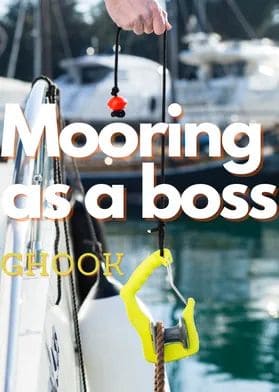Steel AnchorsProducts found: 97
Sale of Steel Anchorsfor Boats\Yachts
Made from stainless or galvanized steel, anchors on a ship, particularly on a cruise yacht, perform several functions. The main thing is to hold the boat in place while docked at the pier or in the open sea due to its adhesion to the underwater soil.
Types and Structure of Anchors
All anchors can be divided into several types according to their function, design and material of manufacture.
Stationary anchors perform the main function of holding the yacht in place. They are constantly wound into fairleads and serve for anchoring.
Spare anchors are identical in design and weight to dead anchors and are stored in specially designated areas on the deck or hold.
Kedge anchors serve to hold the vessel in a certain direction; they are usually launched from the stern and account for 1/3 or 1/2 of the weight of the anchor.
Cats are three- or four-legged anchors weighing several kilograms. Mainly used to find sunken or catch floating objects.
The basis of the anchor design is a longitudinal rod - a shank. At the top the shank ends with a bracket for attaching to the anchor chain, and at the bottom with arms that turn into pointed flukes, or immediately with flukes, as on most modern yacht anchors.
Arms and flukes can be attached to the spindle either in a fixed way or on a hinge. Some anchors also have a transverse stock, which helps to create the position in which the arms cut into the ground better.
A modern anchor strives not so much to hold the vessel in place with an unbearable weight, but rather to provide a stronger and faster grip on the bottom. Hence the experimentally verified angles of the paws to the spindle and the distribution of mass.

All these types of ship anchors can be made of steel, including black, stainless, and galvanized.
Advantages of Steel Anchors
As the name implies, the main material from which these anchors are made is steel. What are the advantages of steel over aluminum, from which modern anchor models are also made? Despite the fact that aluminum is a metal that is slightly susceptible to corrosion, including from contact with sea water, steel anchors are more in demand, especially on large yachts, because they:
- have a smaller size due to the difference in the specific gravity of steel and aluminum;
- do not require pouring lead or other weighting metals inside;
- have reliable protection against corrosion due to the use of stainless or galvanized steel;
- on large ships, heavy anchors made of “black” steel can be used;
- steel anchors can be cast, forged, or welded, while the processing of aluminum anchors has significant limitations: aluminum is difficult to cast and forge, and welding this metal requires special qualifications.
topRik experts will not deny the obvious: aluminum anchor claws can be much thinner, sharper, and the specific gravity of this metal makes it possible to produce a part that is buried in the ground of a much larger size than in steel models. An example is the new CQR anchor models from Fortress. Of course, their high cost justifies their effectiveness, but only if you intend to anchor in soft waters. They will slide on rocky surfaces. This means that such an anchor must be duplicated by a partner who is tough enough for rocky ground.
Types of Steel Anchors at the topRik Marketplace
Marketplace topRik presents steel anchors from well-known suppliers of marine equipment, such as FNI, from Italy. Overall, we have selected different steel models from various countries, which provide high reliability and efficiency with an optimal price-quality ratio.
It is impossible to answer clearly which steel anchor is better for all yachts. Not only do yachts have different dimensions, but each type of anchor has its own characteristics, disadvantages and preferred soils. We have selected for you models that have proven themselves in practice, are popular among yachtsmen, and will not cause fatal damage to your budget.
Let's start with anchors made of stainless steel.
Danforth Anchor
The first in this group of equals is the anchor, invented in the mid-twentieth century by the American engineer Danforth. Consists of a long shank and movable flat flukes, standing close to each other. The stock located below prevents the anchor from falling on its side when it touches the ground. Danforth loves dense sand, on which it can hold up to 50 kilograms per 1 kilogram of its own weight. However, it can cling to pebbly or rocky soils for a long time.
The marketplace offers models weighing from 6 to 30 kg.
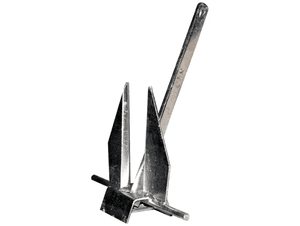
Bruce Anchor
Popular Bruce anchor belongs to the CQR family. Its feature is a wide flat paw, which rakes soft soils well. Feature of the presented models – mirror polished stainless steel.
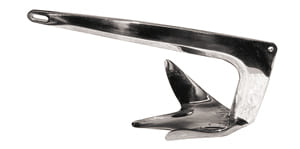
You can choose the Bruce anchor that suits your yacht, focusing on the drawing below and the table below it.
| Weight | Material | A | B | C | D | E | F | G | H |
|---|---|---|---|---|---|---|---|---|---|
| 1KG | STAINLESS STEEL | 100MM | 180MM | 230MM | 60MM | 230MM | 105MM | 35MM | 10MM |
| 2KG | STAINLESS STEEL | 200MM | 350MM | 230MM | 9MM | 300MM | 110MM | 40MM | 7MM |
| 3KG | STAINLESS STEEL | 230MM | 370MM | 250MM | 100MM | 320MM | 125MM | 40MM | 9MM |
| 5KG | STAINLESS STEEL | 230MM | 470MM | 320MM | 11MM | 400MM | 200MM | 52MM | 9MM |
| 7.5KG | STAINLESS STEEL | 270MM | 530MM | 360MM | 14MM | 450MM | 220MM | 60MM | 8MM |
| 10KG | STAINLESS STEEL | 290MM | 580MM | 400MM | 16MM | 470MM | 240MM | 68MM | 11MM |
| 15KG | STAINLESS STEEL | 330MM | 650MM | 420MM | 16.5MM | 560MM | 280MM | 85MM | 11MM |
| 20KG | STAINLESS STEEL | 350MM | 710MM | 500MM | 21MM | 590MM | 310MM | 89MM | 13MM |
| 30KG | STAINLESS STEEL | 410MM | 830MM | 570MM | 18MM | 700MM | 360MM | 115MM | 15MM |
Stainless Steel Grapnel Anchor
This traditional steel anchor folds and unfolds easily and is suitable for small yachts, boats, tenders, RIBs, etc.
In our marketplace Grapnel anchors are presented in models weighing from 0.7 to 2.5 kg with the corresponding parameters indicated in the table below.
| Weight | Material | A | B | C |
|---|---|---|---|---|
| 0.7 KG | STAINLESS STEEL | 185 MM | 195 MM | 50 MM |
| 1.5 KG | STAINLESS STEEL | 290 MM | 310 MM | 80 MM |
| 2.5 KG | STAINLESS STEEL | 330 MM | 360 MM | 85 MM |
Galvanized Steel Anchors
To this group of steel anchors, we add both the models already listed above, only in a different processing, and those that have not yet been mentioned.
So, we'll just list the following models:
Galvanized steel Danforth anchor
| Weight | Material | A | B | C |
|---|---|---|---|---|
| 2 KG | GALVANIZED STEEL | 430 MM | 300 MM | 200 MM |
| 4 KG | GALVANIZED STEEL | 510 MM | 410 MM | 260 MM |
| 6 KG | GALVANIZED STEEL | 570 MM | 440 MM | 300 MM |
| 8 KG | GALVANIZED STEEL | 630 MM | 470 MM | 340 MM |
| 10 KG | GALVANIZED STEEL | 670 MM | 470 MM | 360 MM |
| 12 KG | GALVANIZED STEEL | 700 MM | 550 MM | 370 MM |
| 15 KG | GALVANIZED STEEL | 720 MM | 560 MM | 390 MM |
| 20 KG | GALVANIZED STEEL | 720 MM | 650 MM | 400 MM |
| 25 KG | GALVANIZED STEEL | 750 MM | 680 MM | 440 MM |
| 30 KG | GALVANIZED STEEL | 860 MM | 710 MM | 460 MM |
Galvanized Bruce type anchor
| Weight | Material | A | B | C | D | E | F | G | H |
|---|---|---|---|---|---|---|---|---|---|
| 2,5 KG | GALVANIZED STEEL | 200 MM | 350 MM | 230 MM | 9 MM | 300 MM | 110 MM | 40 MM | 7 MM |
| 5 KG | GALVANIZED STEEL | 230 MM | 470 MM | 320 MM | 11 MM | 400 MM | 200 MM | 52 MM | 9 MM |
| 7,5 KG | GALVANIZED STEEL | 270 MM | 530 MM | 360 MM | 14 MM | 450 MM | 220 MM | 60 MM | 8 MM |
| 10 KG | GALVANIZED STEEL | 290 MM | 580 MM | 400 MM | 16 MM | 470 MM | 240 MM | 68 MM | 11 MM |
| 15 KG | GALVANIZED STEEL | 330 MM | 650 MM | 420 MM | 16,5 MM | 560 MM | 280 MM | 85 MM | 11 MM |
| 20 KG | GALVANIZED STEEL | 350 MM | 710 MM | 500 MM | 21 MM | 590 MM | 310 MM | 89 MM | 13 MM |
| 30 KG | GALVANIZED STEEL | 410 MM | 830 MM | 570 MM | 18 MM | 700 MM | 360 MM | 115 MM | 15 MM |
| 50 KG | GALVANIZED STEEL | 507 MM | 990 MM | 650 MM | 23 MM | 860 MM | 400 MM | 120 MM | 21 MM |
Galvanized Grapnel anchor
| Weight | Material | A | B | C |
|---|---|---|---|---|
| 1,5 KG | GALVANIZED STEEL | 290 MM | 310 MM | 80 MM |
| 2,5 KG | GALVANIZED STEEL | 330 MM | 360 MM | 85 MM |
| 3,2 KG | GALVANIZED STEEL | 350 MM | 400 MM | 95 MM |
| 4 KG | GALVANIZED STEEL | 400 MM | 450 MM | 105 MM |
| 6 KG | GALVANIZED STEEL | 465 MM | 545 MM | 120 MM |
| 8 KG | GALVANIZED STEEL | 540 MM | 580 MM | 130 MM |
| 10 KG | GALVANIZED STEEL | 595 MM | 655 MM | 130 MM |
| 12 KG | GALVANIZED STEEL | 630 MM | 710 MM | 130 MM |
Original Hall anchor in galvanized steel
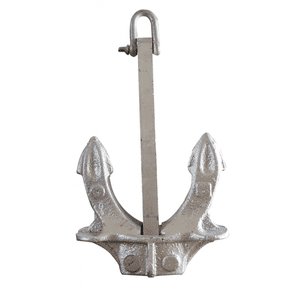
Hall style anchor in galvanized steel
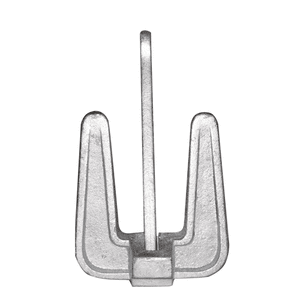
D-type anchor in galvanized steel
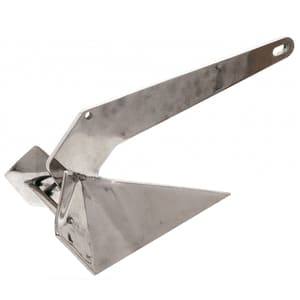
Cobra anchor (see next section)
Britany anchor in highly resistant galvanized steel (see next chapter)
DC anchor
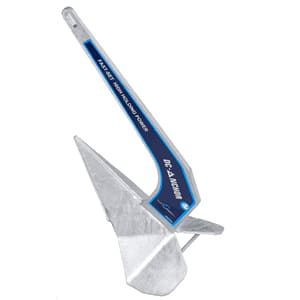
Rochfish anchor in galvanized steel
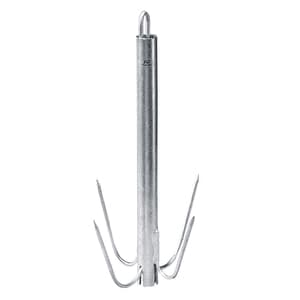
How to Choose a Steel Anchor for a Yacht
The easiest way to calculate the required mass of an anchor for a yacht is to add a kilogram of anchor mass for each meter of vessel length. This is the bare minimum, and extra kilos in reserve will only add peace of mind to the yacht owner when docked. The anchor has the greatest holding force when the shank lies on the ground. Therefore, skippers advise, depending on the type of soil and weather, to give 4-5 depths of the anchor chain - so that the shank is sure to lie on the bottom.
It is better to have two anchors on board - bow and stern. First would be the main one. The second one is rather a safety one; its presence will save you from unnecessary worries while anchoring. But if you plan to break away from the shore for a long time, then a third one will not hurt. The sea is full of surprises, and it’s always good to have a “spare” in the hold, including floating anchor.
As we said above, it is impossible to give one universal advice on which anchor to choose for a particular yacht. But there are manufacturers who are trusted by boaters around the world, and whose products have been tested on hundreds of thousands of miles of sailings. Therefore, when choosing an anchor for your yacht, it makes sense to pay attention to them.
The French Plastimo, widely represented in the topRik marketplace, produces another variation of the plow - the Kobra anchor, which also has excellent “catching on” performance. Kobra does not have high-profile certificates, but its cost is significantly lower than that of Fortress or Lewmar anchors. European yachting publications have described the Kobra as excellent value for money, noting its fast and strong grip on ground, especially in muddy or sandy conditions.
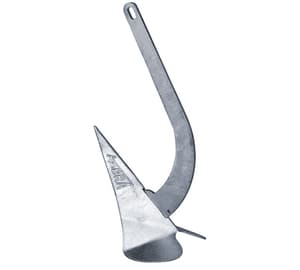
The company also offers SOC swivel anchors - the French version of the British CQR - Britany Anchor made of galvanized steel, which is also presented in this section of the topRik marketplace. It's a flat anchor without joint case, it presents no risk of the spindle blocking and clogging due to mud or stones, furthermore it guarantees an instant grip.
British Lewmar specializes in plows. The company's brands are the famous Delta and CQR. The world's largest classification society, Lloyd's Register, has certified these anchors as having High Holding Power. The manufacturer gives them a lifetime warranty against breakage (but not against bending or deformation). Anchors are available in stainless steel or galvanized steel.
Canada's Rocna is known for its drag plows and their impressive holding characteristics. The company also produces the Vulcan anchor, a curved version of the plow, the younger brother of the Rocna.
The American Mantus is similar to Rocna and “plays” with details rather than with fundamental design differences.
Also interesting are the SUPREME and THE BOSS anchors from the New Zealand company Manson. The main difference between these anchors is the longitudinal slot in the spindle, which allows you to change the vector when raising the anchor. This helps to release the anchor if it gets into a difficult situation - under a snag or rock.
And finally, an anchor, about which there are legends from the not-so-maritime country of the Czech Republic. Ultramarin Anchors company produces has created an anchor that is different in production from all others. Firstly, the shank is made hollow, welded from two halves. This is for the purpose of reducing the weight. At the same time, lead is poured into the crown of the plow. The plow anchor is made using the forging method, this allows the crown to be rounded and more actively grip the soil. Ultramarin is only available in polished stainless steel for better grip on soft mud conditions. Of course, such a complex production technology does not have a positive effect on the price for the consumer.
Please note that the topRik marketplace right now offers models made of polished stainless steel at a very affordable price. If you have questions about equipping your yacht with a steel anchor, ask them ight now to topRik experts - you will receive prompt, professional and absolutely free advice from experienced sailors who have tested all of the above types of steel anchors.

